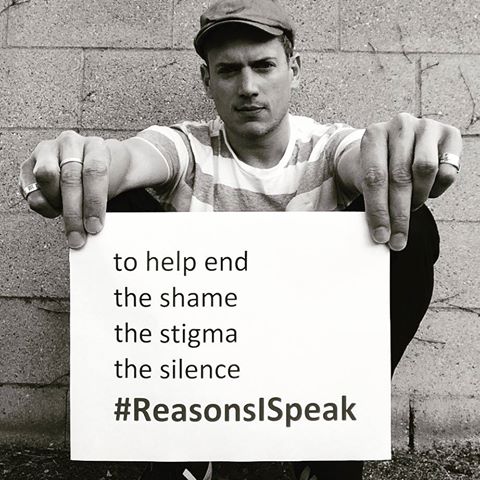Health : Wentworth Miller For National Suicide Prevention
Photo Credits: Wentworth Miller’s Facebook
How do you know a person is suffering from depression?
Actor Wentworth Miller teamed up with The Mighty and created a powerful video for Suicide Prevention Week titled A Day in the Life with Depression that illustrates how it is to live with depression.
Several people in the video appeared asking themselves questions such as: Is this worth it? What’s the point? I’ve failed everyone. I’m so tired. I don’t know what to do. Will I ever be happy? Why can’t you accomplish even simple tasks?
The persistent questions keep on circling round a person’s head, relentless and, seemingly without any form of escape s/he gets tired one day and conclude: I’m so tired. Why bother?
These dangerous thoughts could lead to a dangerous conclusion which is why an understanding on mental illness and how we can help those struggling with depression is important hence the birth of National Suicide Prevention Awareness Month.
Much effort has already been exerted into addressing mental health issues with movements such as Mental Health Awareness Week and National Suicide Prevention Week. However, statistics show there is still much to be done.
In the video shown below, Miller stated that every year depression affects an estimated 15 million people in the United States and 350 million people worldwide.
But depression and suicide affects people from all backgrounds and all ages. The youth, too, especially the LGB youth according to the recent Youth Risk Behavior Study (YRBS) conducted among 9th to 12th graders by the Centers for Disease Control and Prevention (CDC). Their results revealed that the rate of suicide attempts is four times greater for LGB youth compared to that of straight youth.
The results of the study further revealed that 43% of the LGB survey participants seriously considered suicide, 38% even formed a suicide plan, and roughly 30% attempted suicide. You can read their full report here.
What we can do
Looking at the numbers presented it can be overwhelming. However, we can actually help in our own small way and together we just might be able to move a little closer into understanding mental illness if not put a huge dent to the stigma surrounding mental health crisis.
How?
- Through education.
By arming ourselves with information through reading, watching, and attending seminars about mental health, learn more about how to recognize the warning signs of suicide, and know who are at risk. Because education is key to understanding, and it is only through understanding that we can address the issue and overturn the situation. Learn how to reach out and be there for them and in effect make a difference on the life of a person suffering from depression.
The Trevor Project for one, offers CARE Trainings for LGBTQ youth. Read more about it here. The Trevor Project was founded in 1998 by the creators of the Academy Award®-winning short film TREVOR. Today, it is recognized as “the leading national organization providing crisis intervention and suicide prevention services to lesbian, gay, bisexual, transgender and questioning (LGBTQ) young people ages 13-24.”
If you are in Canada, check out http://suicideprevention.ca/ for educational materials and resources. You can also find local crisis centres through this link: http://suicideprevention.ca/need-help/
- Always remember that we can ask for help.
Wentworth Miller—who made no secret of his own shares of struggles with depression and suicide—urged the public to ask for help, suggesting to find a support group in their area by visiting the Anxiety and Depression Association of America at https://www.adaa.org/. He also added that if you or someone you know is in crisis, you can call the National Suicide Prevention Lifeline at 1800-273-TALK or text START to 741-741.
Miller concluded the aforementioned video with an appeal to the viewers. “Don’t be afraid to take the first step. Someone cares, and they are waiting to hear from you.”
This sentiment was echoed by Michelle Obama, the First Lady of the United States who said in an interview over at Prevention’s October 2016 issue that “asking for help is always a sign of strength.”
She explained further that “in order to change the culture’s negative perception around mental illness, parents need to stress the importance of psychological wellbeing to their children.”
“We need to teach our kids that mental illnesses are just like physical illnesses and deserve the same kind of care and compassion,” Michelle concluded.




Life is sucks … If anything can trade me in to die easier and no paints . I will do it